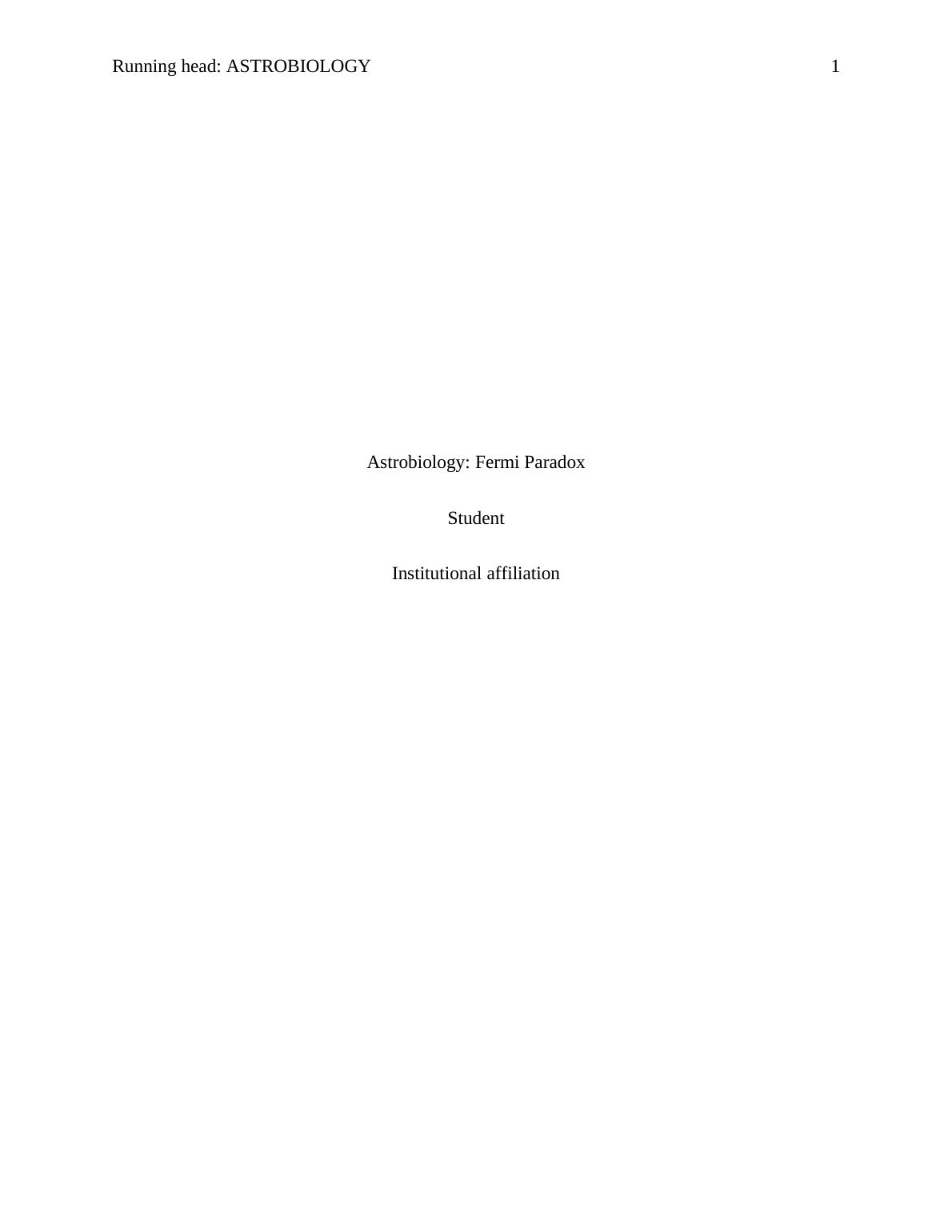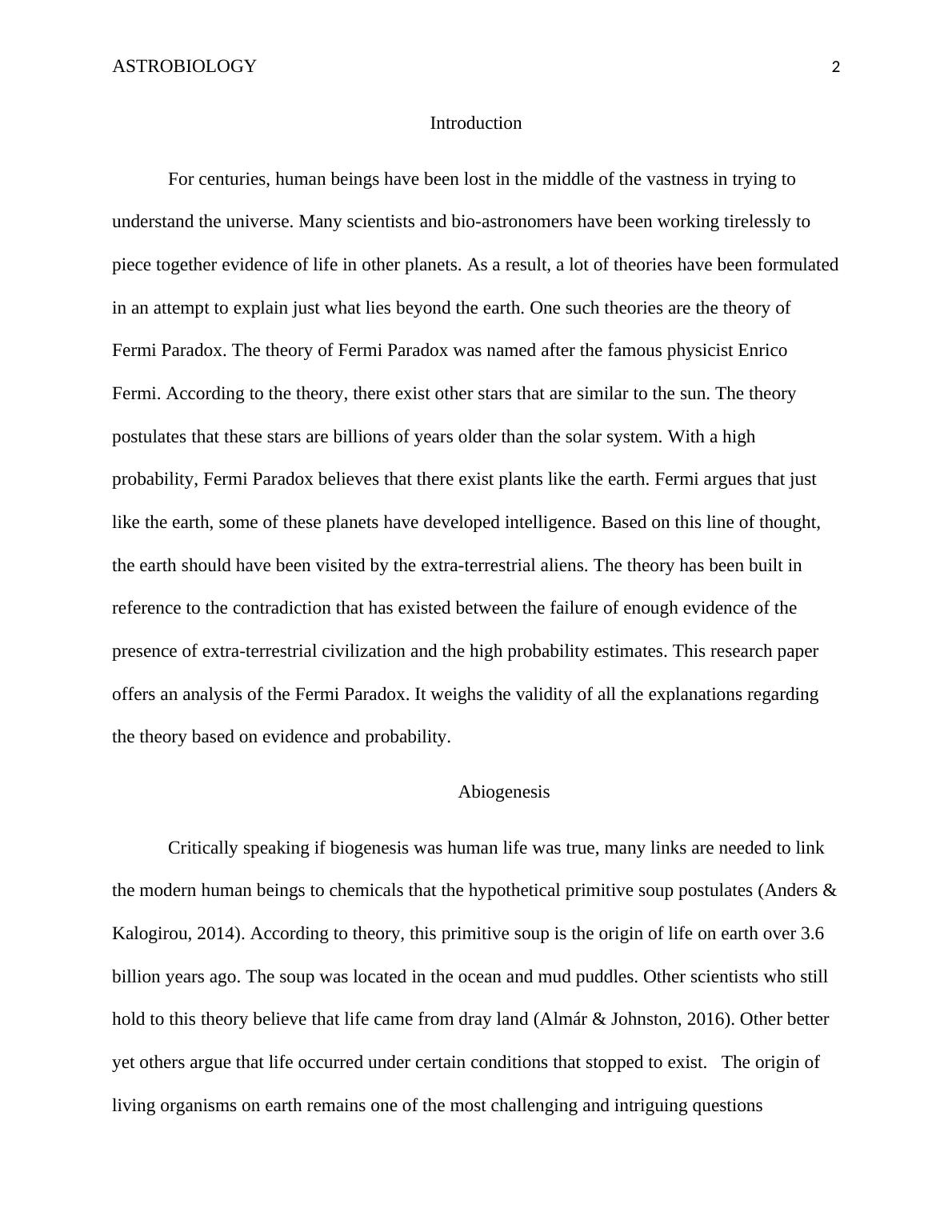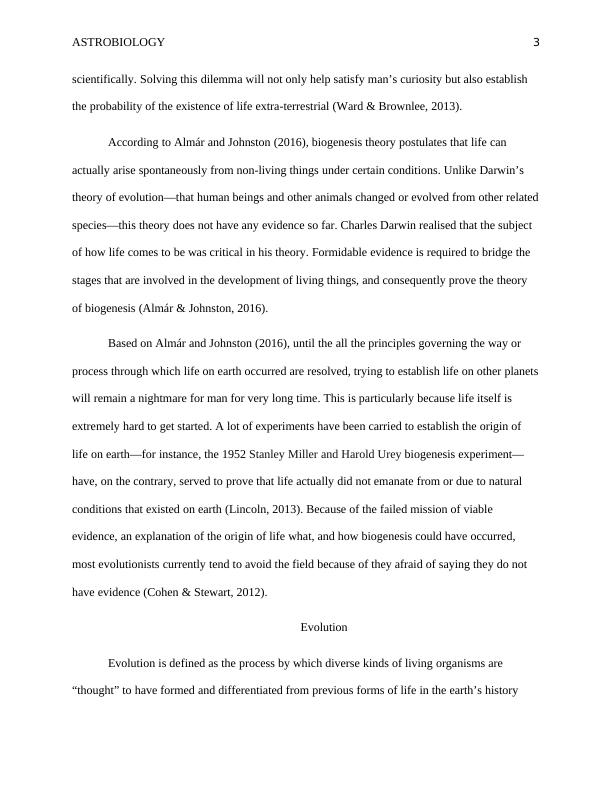ASTROBIOLOGY. 1. Astrobiology: Fermi Paradox Student In
10 Pages2711 Words54 Views
Added on 2022-12-23
ASTROBIOLOGY. 1. Astrobiology: Fermi Paradox Student In
Added on 2022-12-23
ShareRelated Documents
Running head: ASTROBIOLOGY 1
Astrobiology: Fermi Paradox
Student
Institutional affiliation
Astrobiology: Fermi Paradox
Student
Institutional affiliation

ASTROBIOLOGY 2
Introduction
For centuries, human beings have been lost in the middle of the vastness in trying to
understand the universe. Many scientists and bio-astronomers have been working tirelessly to
piece together evidence of life in other planets. As a result, a lot of theories have been formulated
in an attempt to explain just what lies beyond the earth. One such theories are the theory of
Fermi Paradox. The theory of Fermi Paradox was named after the famous physicist Enrico
Fermi. According to the theory, there exist other stars that are similar to the sun. The theory
postulates that these stars are billions of years older than the solar system. With a high
probability, Fermi Paradox believes that there exist plants like the earth. Fermi argues that just
like the earth, some of these planets have developed intelligence. Based on this line of thought,
the earth should have been visited by the extra-terrestrial aliens. The theory has been built in
reference to the contradiction that has existed between the failure of enough evidence of the
presence of extra-terrestrial civilization and the high probability estimates. This research paper
offers an analysis of the Fermi Paradox. It weighs the validity of all the explanations regarding
the theory based on evidence and probability.
Abiogenesis
Critically speaking if biogenesis was human life was true, many links are needed to link
the modern human beings to chemicals that the hypothetical primitive soup postulates (Anders &
Kalogirou, 2014). According to theory, this primitive soup is the origin of life on earth over 3.6
billion years ago. The soup was located in the ocean and mud puddles. Other scientists who still
hold to this theory believe that life came from dray land (Almár & Johnston, 2016). Other better
yet others argue that life occurred under certain conditions that stopped to exist. The origin of
living organisms on earth remains one of the most challenging and intriguing questions
Introduction
For centuries, human beings have been lost in the middle of the vastness in trying to
understand the universe. Many scientists and bio-astronomers have been working tirelessly to
piece together evidence of life in other planets. As a result, a lot of theories have been formulated
in an attempt to explain just what lies beyond the earth. One such theories are the theory of
Fermi Paradox. The theory of Fermi Paradox was named after the famous physicist Enrico
Fermi. According to the theory, there exist other stars that are similar to the sun. The theory
postulates that these stars are billions of years older than the solar system. With a high
probability, Fermi Paradox believes that there exist plants like the earth. Fermi argues that just
like the earth, some of these planets have developed intelligence. Based on this line of thought,
the earth should have been visited by the extra-terrestrial aliens. The theory has been built in
reference to the contradiction that has existed between the failure of enough evidence of the
presence of extra-terrestrial civilization and the high probability estimates. This research paper
offers an analysis of the Fermi Paradox. It weighs the validity of all the explanations regarding
the theory based on evidence and probability.
Abiogenesis
Critically speaking if biogenesis was human life was true, many links are needed to link
the modern human beings to chemicals that the hypothetical primitive soup postulates (Anders &
Kalogirou, 2014). According to theory, this primitive soup is the origin of life on earth over 3.6
billion years ago. The soup was located in the ocean and mud puddles. Other scientists who still
hold to this theory believe that life came from dray land (Almár & Johnston, 2016). Other better
yet others argue that life occurred under certain conditions that stopped to exist. The origin of
living organisms on earth remains one of the most challenging and intriguing questions

ASTROBIOLOGY 3
scientifically. Solving this dilemma will not only help satisfy man’s curiosity but also establish
the probability of the existence of life extra-terrestrial (Ward & Brownlee, 2013).
According to Almár and Johnston (2016), biogenesis theory postulates that life can
actually arise spontaneously from non-living things under certain conditions. Unlike Darwin’s
theory of evolution—that human beings and other animals changed or evolved from other related
species—this theory does not have any evidence so far. Charles Darwin realised that the subject
of how life comes to be was critical in his theory. Formidable evidence is required to bridge the
stages that are involved in the development of living things, and consequently prove the theory
of biogenesis (Almár & Johnston, 2016).
Based on Almár and Johnston (2016), until the all the principles governing the way or
process through which life on earth occurred are resolved, trying to establish life on other planets
will remain a nightmare for man for very long time. This is particularly because life itself is
extremely hard to get started. A lot of experiments have been carried to establish the origin of
life on earth—for instance, the 1952 Stanley Miller and Harold Urey biogenesis experiment—
have, on the contrary, served to prove that life actually did not emanate from or due to natural
conditions that existed on earth (Lincoln, 2013). Because of the failed mission of viable
evidence, an explanation of the origin of life what, and how biogenesis could have occurred,
most evolutionists currently tend to avoid the field because of they afraid of saying they do not
have evidence (Cohen & Stewart, 2012).
Evolution
Evolution is defined as the process by which diverse kinds of living organisms are
“thought” to have formed and differentiated from previous forms of life in the earth’s history
scientifically. Solving this dilemma will not only help satisfy man’s curiosity but also establish
the probability of the existence of life extra-terrestrial (Ward & Brownlee, 2013).
According to Almár and Johnston (2016), biogenesis theory postulates that life can
actually arise spontaneously from non-living things under certain conditions. Unlike Darwin’s
theory of evolution—that human beings and other animals changed or evolved from other related
species—this theory does not have any evidence so far. Charles Darwin realised that the subject
of how life comes to be was critical in his theory. Formidable evidence is required to bridge the
stages that are involved in the development of living things, and consequently prove the theory
of biogenesis (Almár & Johnston, 2016).
Based on Almár and Johnston (2016), until the all the principles governing the way or
process through which life on earth occurred are resolved, trying to establish life on other planets
will remain a nightmare for man for very long time. This is particularly because life itself is
extremely hard to get started. A lot of experiments have been carried to establish the origin of
life on earth—for instance, the 1952 Stanley Miller and Harold Urey biogenesis experiment—
have, on the contrary, served to prove that life actually did not emanate from or due to natural
conditions that existed on earth (Lincoln, 2013). Because of the failed mission of viable
evidence, an explanation of the origin of life what, and how biogenesis could have occurred,
most evolutionists currently tend to avoid the field because of they afraid of saying they do not
have evidence (Cohen & Stewart, 2012).
Evolution
Evolution is defined as the process by which diverse kinds of living organisms are
“thought” to have formed and differentiated from previous forms of life in the earth’s history

End of preview
Want to access all the pages? Upload your documents or become a member.
Related Documents
An examination of the Fermi Paradoxlg...
|11
|2797
|69
